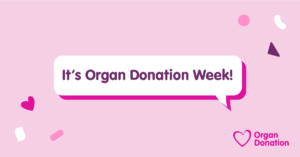
“So, yes, as we were saying, what I can’t understand is why, if so many people are dying of all kinds of things every day, how come there aren’t enough organs for those who need new ones anyway? And, if everybody is considered to be an organ donor in the new system, this opt-out system where your name is automatically on the organ donor list unless you actually say you don’t want it to be there, then why is there still a waiting list for people who need a transplant?
Good question – if everybody could be a donor it would make things a lot easier, wouldn’t it? The thing is, not everybody who dies can be an organ donor. Around 650,000 people die in the UK each year, but only about 1%, 6,500, a tiny minority, could be considered suitable for organ donation. Usually, they are people who have died in a hospital Intensive Care Unit or Emergency Department where starting a conversation about organ donation is an extremely sensitive matter. It is usually associated with the shock and tragedy of sudden death. Most donors are deceased donors. Even if the deceased had signed the organ donor register, the final word rests with grieving families in extreme circumstances.
When a medical team is convinced that their patient has no hope of recovery that hard news is discussed with the family. Only when the family accept the reality of that news and are ready to consider what might happen next are they introduced to a Specialist Nurse for Organ Donation. Their job is to support families through end-of-life conversations and any end-of-life decisions their loved one may have had. They will offer pastoral support and will raise organ donation as part of the end-of-life “pathway”.
When families don’t know what their loved one thought, only about half will say yes. If they know that their loved one would wish to be an organ donor then 9 out of 10 are more likely to agree.
If the preference of the deceased was not to be an organ donor, it is fully respected. Even where legislation says most people are considered to be potential donors unless they opt-out, the final decision is still not taken away from the individual or the family. No UK transplant team is going to remove an organ from a deceased person unless the family give consent. If they say no, it goes no further.
If the family can agree with donation, then the Specialist Nurses begin to assess the suitability of the organs and whether they can be used. Even at this stage, not all can. They work with other transplant specialists to match the potential donors to people on the transplant waiting list. They then take the patient to the operating theatre and support a special transplant surgeon team to retrieve the organs and arrange for them to safely reach their destination, wherever that may be in the UK. They then manage the care after death for the patient and offer more support and care for the family.
So, the chances of dying under circumstances that would allow us to be donors are already very low. Only 1%. Even then, not all organs will be suitable. If half of the affected families are unable to give their consent for donation to go ahead this number falls again. Even if we are on the organ donor register, or haven’t opted out under the new system, the most important thing is to speak to our family and friends about your wishes. It could make an extremely difficult decision just a little bit easier. And it could bring the dawn of hope to others waiting to hear of a kind and generous gift from strangers that can make all the difference between death and new life.
